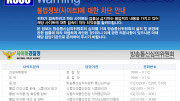A South Korean court has ruled in favor of North Korea Tech and against the Korea Communications Standards Commission (KCSC) over the decision to block the website in South Korea for allegedly violating the country’s National Security Law.
The block began in April last year after the site was recommended for censorship by the National Intelligence Service (NIS) as an illegal website. South Korea routinely blocks websites that promote and glorify North Korea, but glorification of a regime that has killed hundreds of thousands of its own people is not something the site engages in.
Working with Open Net Korea (오픈넷) and the Korea Internet Transparency Report (한국인터넷투명성보고), North Korea Tech initially appealed the block but the KCSC upheld the censorship.
At no time was North Korea Tech or myself contacted or notified of the block by the KCSC or NIS, but the appeal revealed a little more behind the ban. The NIS apparently took issue with links to North Korean websites, the reproduction of the broadcasting schedule of North Korea’s Voice of Korea shortwave service and an article that analyzed a Korean Central TV documentary on the launch of the Kwangmyongsong-4 satellite.
The accusations were fairly ridiculous given links to North Korean sites can be found elsewhere on the web and the sites themselves are blocked in South Korea under the same law. The broadcast schedules too are reproduced elsewhere on the web.
The denial of the appeal led to a court case filed with great assistance from Open Net Korea and lawyer Jiwon Sohn. Ms Sohn attended several hearings on behalf of North Korea Tech and the win wouldn’t have been possible without her hard work.
She’s an expert in South Korean Internet censorship and this is what she said about the outcome:
The Court held that the blocking of a website must be conducted only in an inevitable and exceptional circumstance where the website as a whole can be evaluated as illegal, and therefore it was unlawful to entirely block access to northkoreatech.org which contains a lot of information that cannot be considered as in violation of the National Security Law. The Court also said that KCSC infringed the principle of “minimum regulation” for blocking the website without sufficient investigation and review.
Open Net has criticized that this case is a typical example of the NIS’s indiscriminate reporting and KCSC’s unscrupulous acceptance practice, and shows that KCSC abuses its power to block without due consideration, thereby infringing on the freedom of expression and the right to know on the Internet.
The Korea Communications Standards Commission has a right to appeal the decision and we are currently awaiting its decision.
The latest Korea Internet Transparency Report reports 1,836 cases of web take down requests in 2015 — up from 1,137 in 2014 and 691 cases in 2013.
The Court’s ruling is expected to be a momentum to advance the freedom of expression and the right to know on the Internet by putting a brake on KCSC’s indiscreet blocking practices. KCSC should reflect on the reasoning of this judgment and be more cautious when deciding the legality of online information or a website. Fundamentally, it is necessary to abolish or reduce the KCSC’s takedown authority which enables its arbitrary blocking practice.
I’d like to thank Jiwon Sohn for all her assistance in this case. Without her, none of this would have been possible.
Let’s hope it leads to greater freedom on the South Korean Internet.






Tremendous news Martin,
The people of South Korea got back access to such an important tool today.